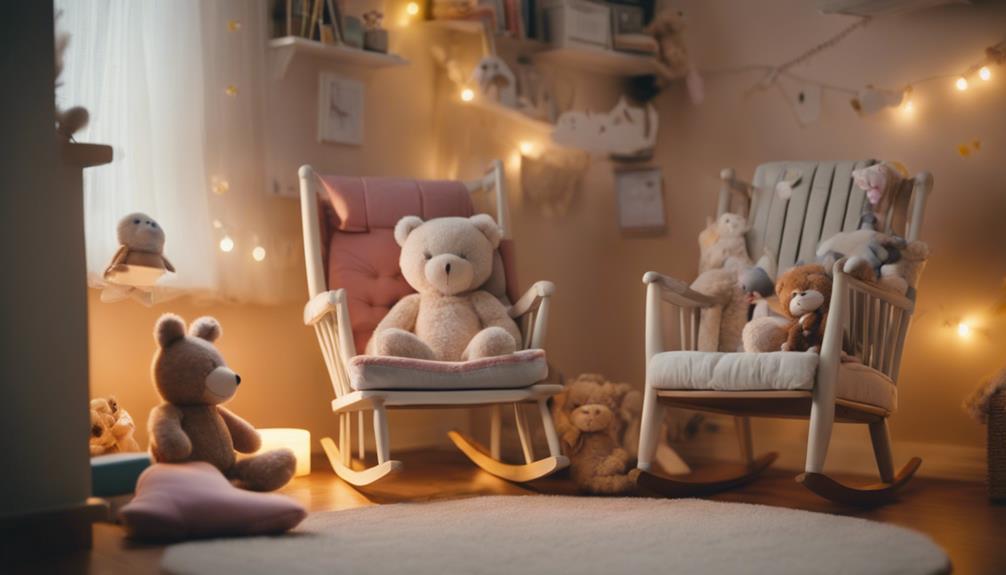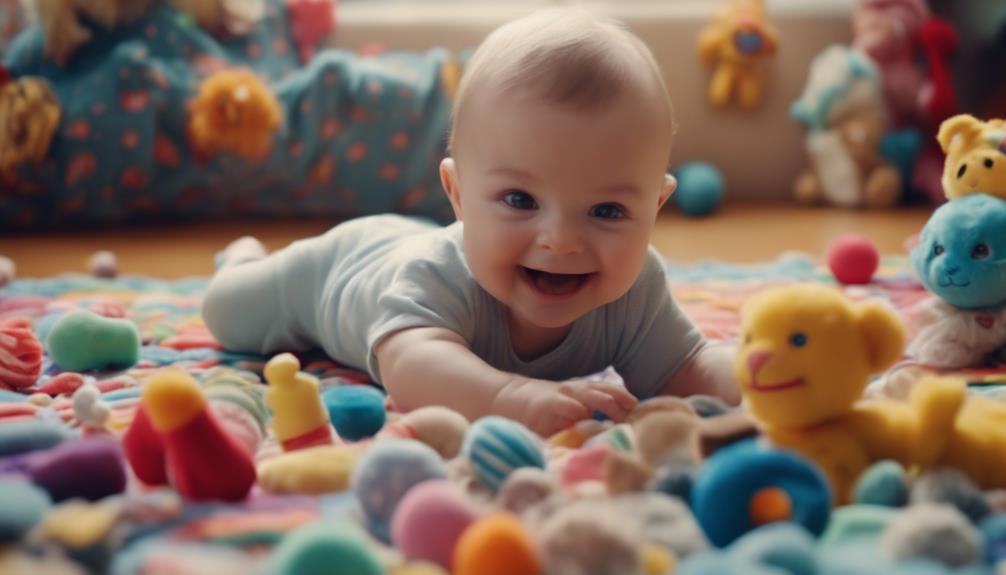To engage your baby, consider promoting social development through eye contact and smiles. Introduce colorful toys for visual stimulation and help improve their perception of colors. Singing lullabies and reading books can enhance language skills and imagination. Incorporate tummy time to help strengthen muscles and encourage cognitive development. Use mirrors to promote self-discovery and try gentle baby exercises to reach developmental milestones. Enjoy leisurely walks for sensory stimulation and emotional bonding with your child. Utilize a range of activities to entertain and support your baby’s growth. Explore these ideas to give your baby enriching experiences for their development and happiness.
Key Takeaways
- Use colorful toys and books for visual stimulation and engagement.
- Sing lullabies, read books, and engage in conversations for language development.
- Incorporate tummy time and gentle exercises for physical development.
- Explore nature for sensory stimulation and cognitive growth.
- Encourage self-discovery with mirrors and sensory activities for cognitive development.
Stimulating Eye Contact and Smiles
To foster healthy social and emotional development in your baby, focus on stimulating eye contact and smiles through playful interactions. Eye contact is an important tool for promoting bonding, communication, and social development in infants. When you engage in eye contact with your baby, you aren't only strengthening your emotional connection but also supporting their brain development.
Smiling is another essential aspect of early social interaction that helps babies express joy and connect with their caregivers. Around 6-8 weeks of age, babies start to engage in eye contact and may even smile back at you. Encouraging these behaviors through interactive play is significant for nurturing your baby's social and emotional well-being.
Playing With Colorful Toys

Engage your baby's visual senses and encourage their exploration by introducing colorful toys during playtime. Colorful toys play an important role in stimulating your baby's visual development and enhancing their perception of different colors.
Babies are naturally drawn to bright colors, finding them engaging and attention-grabbing. By playing with colorful toys, your baby can learn about cause and effect as they interact with various shapes and textures. The different colors presented by these toys can evoke diverse emotions and responses, enriching your baby's sensory experiences.
Introducing a variety of colorful toys not only aids in your baby's visual development but also helps them stay entertained and engaged during playtime. As your baby interacts with these toys, their perception of colors deepens, laying a foundation for future learning.
Singing Lullabies and Reading Books

Consider incorporating singing lullabies and reading books into your baby's daily routine to enhance their development and foster a love for language and storytelling. Singing lullabies not only soothes your baby but also strengthens your bond and promotes relaxation before sleep. The varied tones and rhythms used while singing lullabies aid in language development and sensory stimulation, providing a rich auditory experience for your little one.
Reading books to your baby, especially ones with colorful illustrations, exposes them to language, builds vocabulary, and sparks their imagination. The visual stimulation from colorful pictures captures your baby's attention and engages their senses, contributing to their overall sensory development.
Additionally, incorporating songs and rhymes in lullabies and books enhances auditory processing skills and promotes early language development in babies. By integrating singing lullabies and reading books into playtime, you're providing your baby with valuable opportunities for growth and learning.
Tummy Time Benefits

Tummy time is essential for your baby's muscle development, helping them strengthen their neck, shoulders, and back. It also provides sensory stimulation, aiding in their motor skills and achieving developmental milestones.
Muscle Development Importance
Regular sessions of placing your baby on their stomach, known as tummy time, are essential for developing strong neck, shoulder, and back muscles essential for sitting and crawling. Tummy time plays an important role in muscle development, aiding in the growth of healthy muscles that are needed for your baby to achieve important physical milestones. By engaging in tummy time, your little one not only strengthens their muscles but also enhances their motor skills, setting the foundation for sitting up and eventually crawling.
Additionally, tummy time helps promote visual tracking skills as babies lift their heads to observe their surroundings, supporting their cognitive and sensory development. Starting tummy time early, as recommended by the American Academy of Pediatrics, is key to ensuring that your baby builds the necessary strength for future activities like sitting, crawling, and exploring the world around them.
Sensory Stimulation Benefits
Starting tummy time early not only helps strengthen your baby's muscles but also provides valuable sensory stimulation benefits. Tummy time plays an important role in the development of your baby's visual tracking skills, as they learn to follow objects and people around them.
This activity not only aids in physical muscle development but also enhances fine motor skills as babies reach, grasp, and explore their surroundings from a different perspective. Through tummy time, babies also engage their sense of touch, feeling different textures beneath them, which can contribute to their sensory awareness and cognitive development.
Moreover, regular tummy time sessions can help prevent flat head syndrome by encouraging your baby to shift their head position and relieve pressure on one spot. Additionally, tummy time allows babies to practice lifting their heads, strengthening their neck and shoulder muscles, and promoting coordination.
As your baby engages in tummy time, observe their facial expressions, as it can provide insight into their enjoyment and engagement with the sensory stimulation provided.
Self-Discovery With Mirrors
Using mirrors for self-discovery can greatly benefit your baby's cognitive development and self-awareness. Mirrors provide a unique opportunity for self-recognition, allowing babies to explore their own reflections and expressions. During playtime, engaging with mirrors can stimulate curiosity and encourage interaction, enhancing cognitive skills. By introducing mirrors early on, you can support your baby's emotional development and help them form a sense of identity.
When babies look at themselves in a mirror, they receive visual feedback that aids in self-recognition. This interaction promotes cognitive development by allowing them to connect their movements with the image they see. Additionally, seeing themselves reflected back promotes a sense of self-awareness and can boost their self-confidence.
Incorporating mirrors into your baby's play environment can provide valuable opportunities for growth and exploration. Encourage your little one to interact with their reflection, as this simple activity can have a profound impact on their development.
Gentle Baby Exercises

Incorporate gentle baby exercises into your daily routine to help strengthen your little one's neck, shoulders, and back muscles. Tummy time is a fantastic way to engage in gentle baby exercises, promoting milestone achievement in physical development.
While engaging in these exercises, softly talking to your baby can also encourage language development, fostering early communication skills. Additionally, using colorful toys during exercises can stimulate sensory perception and enhance visual tracking skills, aiding in cognitive development.
Engaging in baby exercises not only helps build physical strength but also contributes to the development of your baby's cognitive abilities and social interaction skills. By incorporating these gentle exercises into your daily routine, you're providing your little one with a vital approach to growth and development.
Walking With Your Baby

Walking with your baby offers a wonderful chance to bond while enjoying the outdoors. Stroller rides together and nature walks provide the perfect setting for quality time and exploration.
These activities not only stimulate your baby's senses but also contribute to their physical and emotional development.
Stroller Rides Together
Enhance your baby's sensory experience and promote relaxation by taking them on stroller rides together. Stroller rides offer a wonderful opportunity to stimulate your baby's senses and aid in their visual development. The varied sights and colors in the environment can engage their curiosity and contribute to their cognitive growth. Additionally, walking with your baby in a stroller can help calm them during fussy periods, providing a soothing experience for both of you.
Engaging in stroller rides isn't only beneficial for your baby's development but also fosters a bonding experience between you and your little one. It allows you to connect with your baby while enjoying the outdoors and some physical activity. Introducing your baby to nature from an early age through stroller rides can help them appreciate the natural world and promote a love for the outdoors.
Nature Walks for Bonding
How can you create a stronger bond with your baby while immersing them in the wonders of nature? Outdoor walks provide the perfect opportunity for bonding and exploration. Nature walks offer sensory stimulation through exposure to various sights, sounds, and textures, contributing to your baby's cognitive development. Walking in natural environments promotes relaxation and emotional connection between you and your little one. Engaging in these outdoor activities not only supports physical development but also fosters a love for the outdoors and environmental engagement from a young age.
Consider the following benefits of nature walks for bonding with your baby:
| Benefits | Description | Examples |
|---|---|---|
| Sensory Stimulation | Exposure to different sights, sounds, and textures in nature for cognitive development | Birds chirping, rustling leaves |
| Bonding | Promotes emotional connection and relaxation between you and your baby | Holding hands, sharing smiles |
| Exploration | Encourages curiosity and exploration of the natural world | Watching insects, feeling tree bark |
| Environmental Engagement | Fosters appreciation for nature and encourages eco-friendly behaviors | Recycling, planting trees |
| Physical Development | Supports physical growth and sensory experiences through outdoor activities | Crawling on grass, feeling sand |
Talking and Textures Discovery

Engage your baby in conversations while exploring various textures to stimulate their senses and language development. Talking to your baby during textures discovery not only enhances their sensory stimulation but also aids in cognitive development. By using descriptive language to narrate the different textures they're feeling, you can help improve their language skills and vocabulary.
Encouraging your baby to touch and feel various textures isn't just a fun activity but also beneficial for their fine motor skills and hand-eye coordination. Combining talking and textures discovery activities creates engaging and educational experiences for your little one, fostering both cognitive and language development simultaneously.
Frequently Asked Questions
How to Keep an Infant Engaged?
To keep your infant engaged, use colorful toys, music, and interactive activities. Incorporate sensory experiences and outdoor adventures for stimulation. Engage in play and exploration to nurture your baby's development and create lasting memories together.
How Do I Keep My Baby Engaging?
To keep your baby engaging, mix up activities like peekaboo, tactile play, and reading. Spice things up with colorful toys, playdates, and outdoor adventures. Remember, a little variety goes a long way in keeping your baby entertained and happy!
How Do I Keep My Baby Engaged While Working?
To keep your baby engaged while working, set up a baby-safe play area nearby, use baby carriers for closeness, take short breaks for interaction, utilize monitors, and consider help from caregivers. Ensuring your baby's engagement is crucial.
How to Keep an Active Baby Busy?
To keep an active baby busy, try sensory play with various textures, incorporate gentle exercises like baby yoga, use interactive toys for cognitive development, sing and play music, and provide outdoor exploration. Keep your little one engaged and happy!
Conclusion
To sum up, engaging with your baby through eye contact, colorful toys, lullabies, and interactive activities is essential for their development. Remember, variety is the spice of life when it comes to keeping your little one entertained and stimulated.
So, don't be afraid to get creative and mix things up to keep your baby happy and engaged. After all, a happy baby is a happy parent, and that's a win-win situation for everyone involved.










